Amnesty International has sparked a glitzy Hollywood backlash from its usual left wing fan-base by submitting a draft policy calling for prostitution to be legalised in order to promote the human rights of prostitutes.
Hollywood actresses Lena Dunham, Emma Thompson, Kate Winslet and Meryl Streep are among thousands who have called on the NGO not only to vote down, but to withdraw altogether a draft policy on sex work calling for the human rights of sex workers to be upheld by making prostitution legal.
Amnesty argues that prostitution is voluntary and as such should be legalised, but critics have called this stance naïve at best, pointing out that a choice of one option is no choice at all. Others have accused Amnesty of using human rights as a cover to advance their left wing agenda.
Although founded in the early 1960s simply to tackle human rights abuses worldwide, Amnesty quickly became a champion of left wing causes, replete with a multi-million pound budget part-funded by Western governments. Recent campaigns include action to legalise abortion in Ireland, and the organisation has become known for its anti-Israeli rhetoric.
So far, these positions have been rewarded with praise and generous support from left wing luvvies in Hollywood and elsewhere. But a policy document, due to be voted on by Amnesty’s leaders at their upcoming Council Meeting on August 10, has seen those stars criticising Amnesty in the strongest terms.
Unlike trafficking, which is forced, Amnesty argues that prostitution is voluntary and therefore should not be seen in the same light. The document states: “Sex work involves a contractual arrangement where sexual services are negotiated between consenting adults, with the terms of engagement agreed between the seller and the buyer of sexual services. By definition, sex work means that sex workers who are engaging in commercial sex have consented to do so, (that is, are choosing voluntarily to do so).”
Jessica Neuwirth, an international human rights lawyer has taken to The Guardian to hit back against the proposal, pointing out: “This definition fails to take into account the dire economic need, the childhood sexual abuse, the brutal coercion employed by pimps, and the vast power differences of sex and race that drive the commercial sex industry.”
Amnesty counter later in their policy that they do understand the background to prostitution, but say “such conditions do not inevitably render individuals incapable of exercising personal agency.”
However, Neuwirth says that they are again wrong. “This argument ignores the reality for the vast majority of individuals exploited by the commercial sex industry,” she said.
Citing the example of UN peacekeepers trading food and medicine for sex, she writes: “These transactions […] might technically be consensual, but can hardly be considered examples of free will. There is no choice in the absence of the freedom to choose otherwise.”
Absurdly, a document uncovered last year makes it abundantly clear that, although Amnesty recognise that some people who enter prostitution have limited choices available to them, Amnesty sees this as being akin to the choices that coal miners or domestic servants make when taking up their jobs.
That document read: “Amnesty International understands the imperfect context in which individuals choose to become sex workers (or miners or foreign domestic workers.)”
Nic Conner, the Social Affairs Research Fellow for conservative think tank The Bow Group told Breitbart London that he believed Amnesty, far from promoting the human rights of prostitutes, were merely using human rights as a sop for promoting a left wing agenda.
“This is the perfect example of how ‘human rights’ have moved from being natural rights inherited at birth by every person on earth, to being a by-word for left-wing libertarianism,” he said.
“Organisations such as Amnesty International are using the cover of human rights in an attempt to impose their left-wing agenda upon us, so that if decent men and woman disagree with AI’s agenda they can imply they disagree with the natural rights of humans.
“It is not the case that sex work is some amusing slap-and-tickle as portrayed by the ITV’s Secret Diary of a Call Girl. Some prostitutes have been trafficked into the UK by gangs to be used as slaves in brothels, while others voluntarily entered prostitution due to a combination of poverty, poor mental health and addiction.
“If Amnesty International had its way, the women, men, boys and girls who enter prostitution under those toxic combinations of disaster will not just have their abuse legalised and legitimised, but the right to abuse them will be engraved as a human right.”
A spokesman for Amnesty said: “Sex workers are one of the most marginalised groups in the world so it is important that we understand how, as Amnesty International, we can work to support their human rights.
“This is a divisive, sensitive and complex issue and it is important that we get it right. That is why we have been working for the last two years to develop a proposed policy to protect the human rights of sex workers based on solid research and consultation with stakeholders.
“It is important to stress that given that the consultation process is still on-going, no decisions have been made. No policy has been adopted by Amnesty International and it is not possible to speculate about the eventual outcome of the vote.”

COMMENTS
Please let us know if you're having issues with commenting.